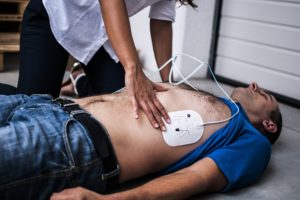
Sudden cardiac arrest often results from a disturbance of electrical activity in the heart which can lead to the sudden stoppage of blood flow. In some cases, a heart attack can trigger sudden cardiac arrest by causing an electrical disturbance.
In case of a sudden cardiac arrest, immediate medical attention is required, or else chances of survival become quite slim.
Causes of sudden cardiac arrest
Arrhythmia (ventricular fibrillation): An arrhythmia is an irregular heart beat, which is often caused by problems in the electrical system of the heart.
Coronary artery disease: Clogged arteries restrict blood flow to the heart, interfering with its electrical pulses.
Physical stress: Intense physical activity, low potassium or magnesium levels, major blood loss, and severe lack of oxygen can contribute to a sudden cardiac arrest.
Inherited disorders: Arrhythmia, for example, may run in families. This can be a result of an inherited long QT syndrome, which is a disorder of the heart’s electrical activity.
Structural changes in the heart: Structural changes in the heart can lead to changes in the way the heart’s electrical system performs.
Heart attack: A heart attack can trigger ventricular fibrillation and sudden cardiac arrest. Heart attacks can also leave behind scar tissue, which can make it difficult for electrical pulses to travel, resulting in heart rhythm abnormalities.
Enlarged heart (cardiomyopathy): When the heart muscle stretches or enlarges, one may develop damaged tissue and potential arrhythmias.
Valvular heart disease: The heart muscle stretches or thickens if the valves leak or are narrow. This increases the risk of heart arrhythmias and, hence, the risk of a sudden cardiac arrest.
Electrical problems in the heart: Problems with the heart valves or muscle itself can contribute to electrical problems in the heart which may be caused by Brugada’s syndrome and long QT syndrome.
Common risk factors for sudden cardiac arrest
Common risk factors of cardiac arrest include a family history of coronary artery disease or cardiac arrest, family history of other forms of heart disease, smoking, high blood pressure, high blood cholesterol, obesity, diabetes, sedentary lifestyle, alcohol consumption, age, being male, illegal drug use, and a nutritional imbalance such as low potassium or low magnesium levels.
Signs and symptoms of sudden cardiac arrest
Signs and symptoms of sudden cardiac arrest are unexpected, immediate, and quite drastic. These can include sudden collapse, no pulse, no breathing, and loss of consciousness. Symptoms preceding sudden cardiac arrest include fatigue, fainting, blackouts, dizziness, chest pain, shortness of breath, weakness, palpitations, or vomiting. Generally, though, sudden cardiac arrest does not present any symptoms.
If you experience frequent bouts of chest pain or dizziness, heart palpitations, shortness of breath, fainting or near fainting, or lightheadedness, you should see your doctor right away. You should also work on managing your modifiable risk factors in order to reduce your risk of sudden cardiac arrest.